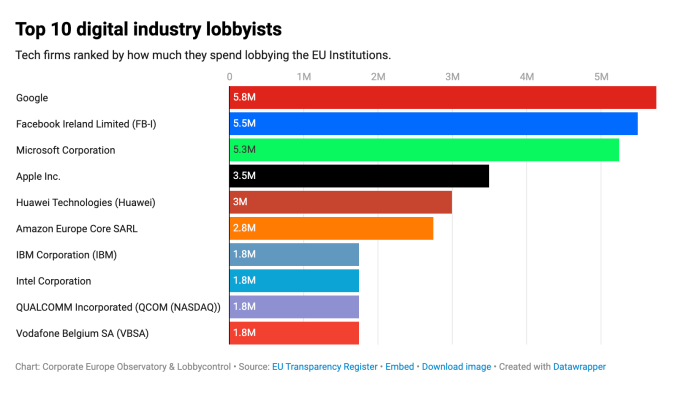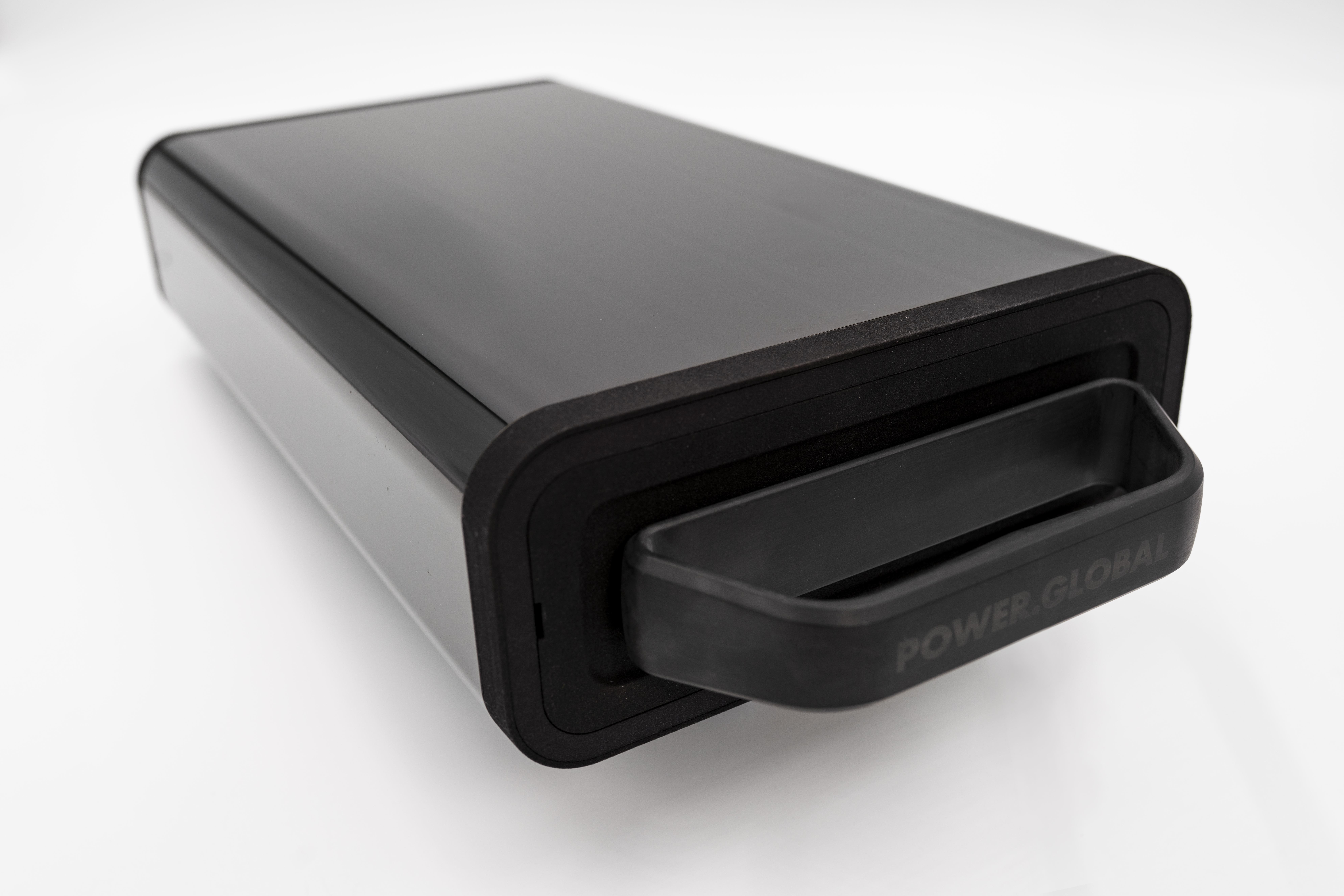The scale of the tech industry’s spending to influence the European Union’s tech policy agenda has been laid out in a report published today by Corporate Europe Observatory and Lobbycontrol — which found hundreds of companies, groups and business associations shelling out a total of €97 million (~$115M) annually lobbying EU institutions.
The level of spending makes tech the biggest lobby sector in the region — ahead of pharma, fossil fuels, finance, and chemicals — per the report by the two lobbying transparency campaign groups.
The EU has a raft of digital legislation in train, including the Digital Markets Act, which is set to apply ex ante controls to the biggest ‘gatekeeper’ platforms to promote fair competition in the digital market by outlawing a range of abusive practices; and the Digital Services Act, which will increase requirements on a swathe of digital businesses — again with greater requirements for larger platforms — to try to bring online rules in line with offline requirements in areas like illegal content and products.
Tackling online disinformation and threats to democratic processes — such as by updating the EU’s rules for political ads running online and tighter regulation of online ad targeting more generally is also being eyed by Brussels-based lawmakers.
The bloc is also in the process of agreeing a risk-based framework for applications of artificial intelligence.
Data reuse is another big EU regulatory focus.
At the same time, enforcement of the EU’s existing data protection framework (GDPR) — which is widely perceived to have been (mostly) weakly applied against tech giants — is another area where tech giants may be keen to influence regional policy, given that uniformly vigorous enforcement could threaten the surveillance-based business models of online ad giants like Google and Facebook.
Instead, multiple GDPR complaints against the pair are still sitting undecided on the desk of Ireland’s Data Protection Commission.
A small number of tech giants dominant EU lobbying, according to the report, which found ten companies are responsible for almost a third of the total spend — namely: Google, Facebook, Microsoft, Apple, Huawei, Amazon, IBM, Intel, Qualcomm and Vodafone — who collectively spend more than €32M a year to try to influence EU tech policy.
Google topped the lobbying list of Big Tech big spenders in the EU — spending €5.8M annually trying to influence EU institutions, per the report; followed by Facebook (€5.5M); Microsoft (€5.3M); Apple (€3.5M); and Huawei (€3M).

Unsurprisingly, US-based tech companies dominate industry lobbying in the EU — with the report finding a fifth of the companies lobbying the bloc on digital policy are US-based — although it suggests the true proportion is “likely even higher”.
While China (or Hong Kong) based companies were only found to comprise less than one per cent of the total, suggesting Chinese tech firms are so far not invested in EU lobbying at anywhere near the level of their US counterparts.
“The lobbying surrounding proposals for a Digital Services pack, the EU’s attempt at reining in Big Tech, provides the perfect example of how the firms’ immense budget provides them with privileged access: Commission high-level officials held 271 meetings, 75 percent of them with industry lobbyists. Google and Facebook led the pack,” write the pair of transparency campaign groups.
The report also shines a light on how the tech industry routinely relies upon astroturfing to push favored policies — with tech companies not only lobbying individually but also being collectively organised into a network of business and trade associations that the report dubs “important lobby actors” too.
Per the report, business associations lobbying on behalf of Big Tech alone have a lobbying budget that “far surpasses that of the bottom 75 per cent of the companies in the digital industry”.
Such a structure can allow the wealthiest tech giants to push preferred policy positions under a guise of wider industry support — by also shelling out to fund such associations which then gives them an outsized influence over their lobbying output.
“Big Tech’s lobbying also relies on its funding of a wide network of third parties, including think tanks, SME and startup associations and law and economic consultancies to push through its messages. These links are often not disclosed, obfuscating potential biases and conflicts of interest,” the pair note, going on to highlight 14 think tanks and NGOs they found to have “close ties” to Big Tech firms.
“The ethics and practice of these policy organisations varies but some seem to have played a particularly active role in discussions surrounding the Digital Services pack, hosting exclusive or skewed debates on behalf of their funders or publishing scaremongering reports,” they continue.
“There’s an opacity problem here: Big Tech firms have fared poorly in declaring their funding of think tanks – mostly only disclosing these links after being pressured. And even still this disclosure is not complete. To this, Big Tech adds its funding of SME and startup associations; and the fact that law and economic experts hired by Big Tech also participate in policy discussions, often without disclosing their clients or corporate links.”
The 14 think tanks and NGOs the report links to Big Tech backers are: CERRE; CDI, EPC, CEPS, CER, Bruegel, Lisbon Council, CDT, TPN, Friends of Europe, ECIPE, European Youth Forum, German Marshall Fund and the Wilfried Martens Centre for European Studies.
The biggest spending tech giants were contacted for comment on the report. We’ll update this article with any response.
We have also reached out to the European Commission for comment.
The full report — entitled The Lobby Network: Big Tech’s Web of Influence in the EU — can be found here.

from TechCrunch https://ift.tt/3zwl0E1
Joanna Stern / Wall Street Journal:

















